Lessons from History That Teach Nothing: The Cuban Missile Crisis and Its Consequences
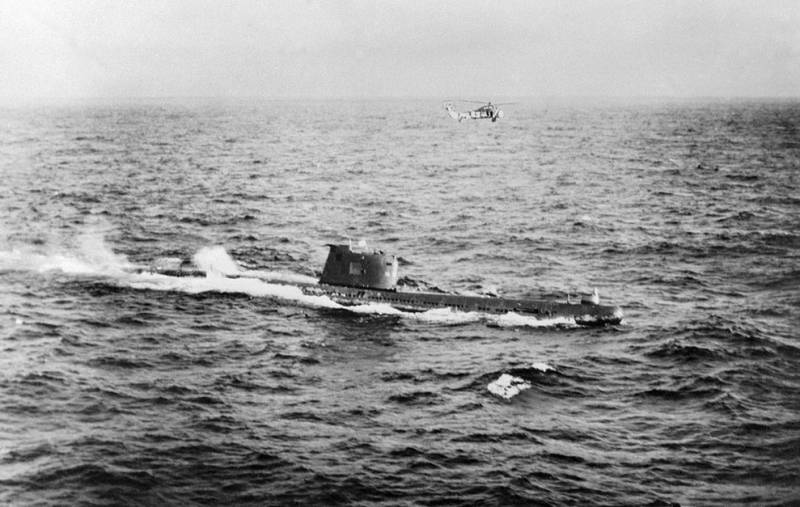
In October 1962, the sharpest confrontation between the USSR and the USA took place in history relations between these countries, as a result of which the world was on the verge of a catastrophe - a nuclear war. 60 years have passed since then, but this topic still has not lost its relevance, and in the current conditions, when we are witnessing another round of geopolitical confrontation between the United States and its allies and Russia, on the contrary, it has sparkled with new colors. Today, more and more often one can hear the opinion that the world has returned to the period that entered the history of international relations under the name "cold war". This opinion is justified - politicians make rash statements, over the past few weeks we have heard again and again sayings about the possible use of nuclear weapons. weapons.
A lot has been said and written about the Caribbean crisis, however, due to the relevance of the main conclusions arising from the analysis of this episode of history, interest in these events does not weaken. The historical context of the Cold War, the apogee of which was the Caribbean crisis, one way or another, forces everyone who refers to the events of the autumn of 1962 to consider it from the standpoint of the confrontation between the two superpowers - the USSR and the USA. However, Cuba itself was also one of the participants in these events, it is no coincidence that in the United States the conflict in the fall of 1962 is called the "Cuban missile crisis".
In this material, we will try to answer the following questions - who is to blame for unleashing the crisis, did it have "winners" and "losers", was Cuba a subject or object of politics in the events of the autumn of 1962, and how much did it really influence the decisions that received in Moscow. In addition, we will try to understand why historical lessons are often not learned by anyone, which is why historical events tend to repeat themselves, just in a slightly different form, in the form of similar, but not identical plots.
Causes of the Caribbean Crisis
Speaking about the causes of the Caribbean crisis, it is inevitable to raise the question of the guilt of the USSR and the USA in unleashing this crisis. It is not possible to answer this question unequivocally; it will be possible to argue only about the degree of guilt of the parties for unleashing this crisis. The official positions of the USSR and the USA, due to their bias, are not able to bring us closer to the answer to this question.
If, according to the USSR, the deployment of missiles in Cuba in the autumn of 1962 was Moscow's reaction to the installation of American missiles in Turkey a year earlier, which were capable of reaching the Soviet capital and therefore posed a direct threat to the Soviet state, then the official position of Washington, public opinion in America and many countries around the world defined US behavior as a response to the deployment of Soviet nuclear missiles in Cuba, capable of reaching Washington. If in the USSR they believed that the USA was the culprit of the crisis, then in the USA, on the contrary, they argued that the crisis was created by the USSR [1].
This practice of shifting responsibility for the aggravation of the international situation onto each other is also characteristic of the present time. At the same time, neither in 1962, nor today, no one denied and does not reject the fact that a year earlier US missiles were deployed near the USSR, considering this as a natural right of the world's largest power. American politicians like to assert, speaking about the foreign policy of their country, that the use of force by the United States abroad is always explained by the fact that their force is virtuous, and their virtue has significant force, referring either to T. Roosevelt, who professed political realism, or to V. Wilson, who preached political idealism [1].
An example of such a one-sided approach is the book "The Edge: The Cuban Missile Crisis of 1962" by the American researcher D. Detzer, published in New York in 1979, in which the USSR is called the only culprit of the Caribbean crisis. Among its reasons, the author lists: firstly, the backlog of the USSR in the field of nuclear weapons and the desire of the Soviet leadership to change the balance of forces in one action; secondly, the desire to solve the German question in this way and prevent an American attack on Cuba, which would be a big blow to the political prestige of the USSR; thirdly, the weakening of the position of N. S. Khrushchev in the Politburo, the low effectiveness of Khrushchev's reforms, prompting him to search for something significant in the field of foreign policy [1].
It is hard to ignore the fact that the Caribbean crisis was indeed preceded by an attempt by the United States to change the existing military-political balance of power in Europe in its favor. Let us recall the chronology of those events. So, already in 1959, two squadrons of 15 missiles each, divided into five batteries, were deployed in Northern Italy, and another 10 batteries were deployed in 1961. At the end of October 1959, the Turkish government agreed (on the same conditions as and Italy) to deploy one missile squadron (15 IRBM) on their territory. In 1961, the United States began deploying 15 PGM-19 Jupiter medium-range missiles with a range of 2400 km in Turkey, which directly threatened the European part of the Soviet Union, up to Moscow [1].
Should the Soviet leadership react (and could it not?) to such a change in the military-political situation? The head of the Soviet Union, Nikita Khrushchev, publicly expressed his indignation at the fact of the deployment of missiles in Turkey and considered this as a personal insult [1].
It was after the deployment of American missiles in Turkey that the leadership of the USSR began to probe the possible reaction of the Cuban government to the deployment of Soviet troops and weapons in Cuba. For this reason, it is somewhat presumptuous to claim that it was the attempt by Cuban counter-revolutionaries, acting on instructions from Washington, to overthrow the Cuban government that became the main reason for the deployment of Soviet troops and missiles in Cuba. However, we will discuss the role of Cuba in the Caribbean crisis in more detail below.
It should be noted that the interpretation of the events of the autumn of 1962 changed depending on the important changes in the international arena. During periods of “thaw” in relations between the two countries, the emphasis was on “wisdom and endurance”, which allowed politicians and the military to prevent a nuclear catastrophe. However, a new "cooling" in relations between Russia and the United States is also reviving many Cold War stereotypes, in particular, accusations of the opposite side of aggressiveness and recklessness [2].
The role of the Cuban government in the events of autumn 1962
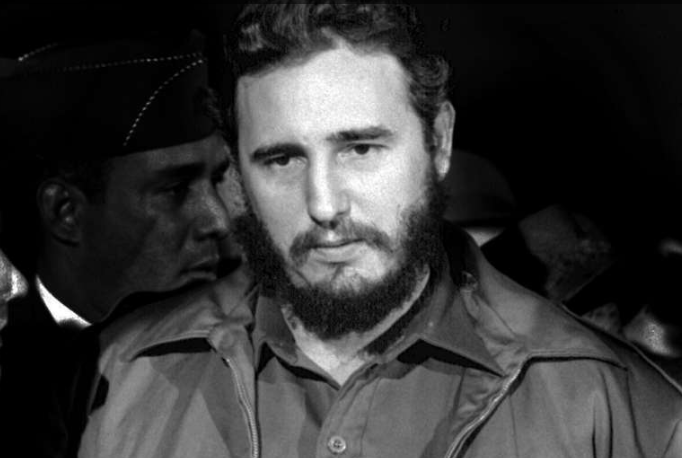
The largest island in the Caribbean basin appeared on the agenda of relations between the two superpowers at the turn of the 1950s and 1960s, after the victory in Cuba in January 1959 of the radical leftist rebel movement led by Fidel Castro [3]. On January 1, 1959, in Cuba, young radical left-wing reformers overthrew the pro-American dictatorial regime of Batista. A sharp deterioration in relations between the US and Cuba followed.
When on January 10, 1959, two days after the entry of the main column of the Rebel Army into Havana, the chairman of the Presidium of the Supreme Soviet of the USSR K. E. Voroshilov, by telegram, announced the recognition by the Soviet Union of the Provisional Government of the Republic of Cuba, and no one in the leadership of the USSR had any idea about what forces controlled the new revolutionary regime. However, events developed rapidly. To everyone's surprise, a year and a half later, the pro-communist nature of the regime in Cuba became obvious, and on April 16, 1961, Fidel Castro openly proclaimed the Cuban revolution as socialist [3].
In March 1960, US President D. Eisenhower signed a secret directive on the creation of detachments of Cuban counter-revolutionary emigrants in the United States to land on Liberty Island. Soon, an air assault brigade was formed from them, which, in addition to carrying out terrorist actions and sabotage, in the autumn of 1960 began preparations for an armed invasion of the island. In response to US assistance to the counter-revolutionaries, F. Castro began to seek support from the Soviet Union [4].
The new US President John F. Kennedy gave his consent to the anti-Cuban action prepared by the CIA under Eisenhower. On April 17, 1961, American planes camouflaged as the Cuban Air Force bombed Cuba, after which armed detachments of Cuban emigrants trained in the United States landed on the island. With the support of the Cuban leadership by the absolute majority of the population, the brigade of mercenaries who landed on Playa Giron was quickly destroyed. This victory caused serious damage to the prestige of the American administration and brought enormous popularity to the regime of F. Castro. The failure of open intervention intensified the anti-Cuban activities of the United States, which considered Cuba as a security threat to their country [4].
In the early 1960s Cuba occupied a special place in Soviet foreign policy, which was based on the principles of class solidarity and proletarian internationalism. One of the main directions was the protection of the freedom and sovereignty of Cuba. Soviet-Cuban military cooperation began at the end of 1960. Soviet modern armored, artillery and mortar weapons and some types of small arms began to be supplied to Cuba.
Cuban historiography, expressing the official position of Havana, assessing the actions of the US government in the period between the landings on Playa Giron and the Caribbean crisis, characterized them as "prelude to direct armed intervention in Cuba" [5]. The leadership of the USSR also showed concern about the security of socialist Cuba. It informed F. Castro that Soviet intelligence managed to obtain absolutely reliable information regarding the American Mongoose plan, which, along with acts of sabotage within the country, provided for a direct large-scale invasion of the US armed forces [3].
However, the decision to deploy missiles in Cuba was made by N. Khrushchev after the US deployed missiles in Turkey. According to one version, N. S. Khrushchev found out about this during a visit to Bulgaria in May 1962. According to A. I. Mikoyan, First Deputy Chairman of the Council of Ministers of the USSR, the idea of \u20b\u1962bdefending Cuba by deploying missiles with nuclear warheads there was the first was voiced by N. S. Khrushchev after his return from Bulgaria on May 3, XNUMX [XNUMX].
Further, the Soviet leadership immediately began to probe the possible reaction of the Cuban government to such a proposal. The delegation, headed by the leader of Uzbekistan as a distraction, arrived in Havana late in the evening of May 29, 1962. On the morning of May 30, members of the delegation had a conversation with Fidel and Raul Castro. The coordination of details with the Cuban side took place on May 31 - June 9, 1962. In the final text of the Soviet-Cuban treaty, in particular, it was noted that the USSR would send its armed forces to Cuba to strengthen its defense capability in the face of the danger of aggression from outside, thus contributing to the maintenance of peace throughout the world.
The operation itself, which received the code name "Anadyr", was being prepared under the guise of a strategic exercise with the relocation of troops and military equipment by sea to various regions of the Soviet Union. The first ship arrived in Cuba on July 26, 1962, and then 42 people were smuggled to the island within two months. personnel with weapons, equipment, ammunition, food and building materials. Nuclear ammunition for strategic missiles R-12 with a capacity of 1 megaton, 6 aviation atomic bombs, as well as nuclear warheads for tactical weapons - missiles "Luna", FKR "Sopka" with a capacity of 3 to 12 kilotons were delivered to the island on October 4.
Was Cuba a subject or object of international politics in the events of the autumn of 1962? And how much did the Cuban leadership influence the position of the USSR?
In order to answer this question, it is enough to note that Moscow decided to withdraw the missiles from Cuba without the consent of F. Castro, which caused great irritation of the Cuban leader, since the issue of their deployment was reflected in the bilateral agreement. Moreover, Castro was also dissatisfied with the fact that the USSR agreed to American inspections of the withdrawal of Soviet missiles. In a message to N. S. Khrushchev dated October 31, he wrote:
Caribbean crisis in the mirror of the media of the USSR and the USA
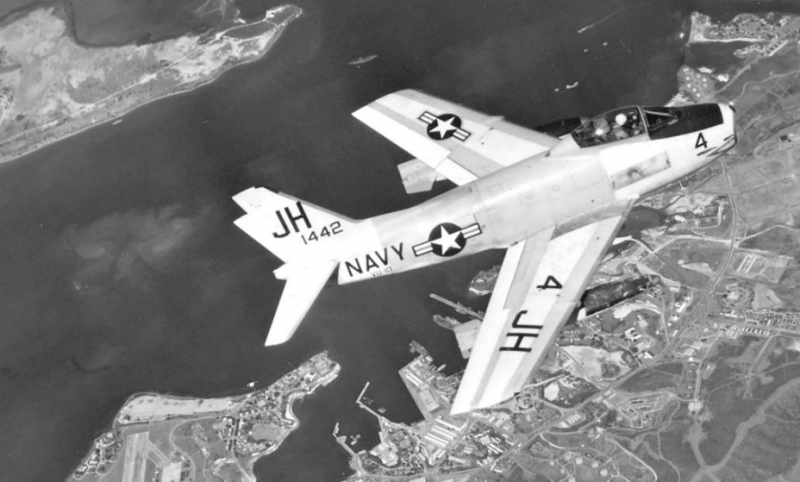
A US Navy FJ-3M Fury fighter jet flies over McCull Field, Guantanamo Bay, Cuba, 1962
The USSR and the USA used the media as one of the tools to influence the audience, both during the Caribbean crisis and earlier, during the Cold War. A negative image of the USSR was formed in the press of the United States, just as a negative image of America was formed in the Soviet press.
If we talk about the American media, then starting from October 22, after the statement of US President John F. Kennedy that Soviet nuclear missiles were deployed in Cuba, quite a lot of materials aggressive towards the USSR were also placed there. In particular, the front page of The New York Times, dated October 23, 1962, ran under the heading:
One of the articles anticipates the published speech of J. Kennedy:
This statement is presented as the only truthful and does not require proof, which is an outright manipulation.
If we talk about other publications, then half the page of the front page of the Dailynews, published on October 23, was occupied by the headline “We blocked the army of Cuba”, followed by the loud subtitle “Red ships will be found or sunk". The USSR is openly called the aggressor.
The plan to counter the Soviet Union, announced on television by the American president, was supported by many congressmen and prominent political figures, who were quoted by the media. Republican Senator Ken Keating said:
According to K. Keating,
In his statement, he noted:
If we talk about the Soviet press, then in the period from September to October 1962, Pravda published 121 publications concerning Cuban events. Content analysis showed that in 93,4% of publications it was said that the United States was putting the world on the brink of nuclear war. For this, the lexemes "general world war", "thermonuclear war" were used. Absolutely in all publications, the blame for the conflict was completely shifted to the United States. This is evidenced by such ideologemes as "American imperialism", "American aggressors", "intervention", "provocation", "big stick" [8].
In order to form a “correct” idea among the Soviet people about the participants in the Caribbean crisis and their role in the development of the conflict, Pravda resorted to hushing up the facts and falsifying them. So, on September 25, Fidel Castro announced that the USSR intended to create a base in Cuba for its fishing fleet. This fact was covered by Pravda in passing, since in reality this base was supposed to become a cover for the Anadyr operation to deploy Soviet nuclear missiles on the Island of Freedom. The situation is similar with the material “The Imperialists Do Not Let Up,” in which TASS accuses the United States of violating Cuban air borders by a military aircraft, which was regarded as “a new provocation by the US imperialists". However, this material did not say a word about the fact that an American intelligence officer discovered Soviet medium-range missiles during this flight [9].
When covering the Caribbean crisis, Pravda fully supported the position of the Soviet government, publishing not only statements, speeches, appeals of its representatives, but also reinforcing them with other materials: statements by Soviet citizens in support of the chosen international tactics, quoting materials from foreign periodicals echoing Soviet politicians [9] .
In general, as historian Vladimir Lota notes in his book “Armageddon is cancelled. Caribbean Crisis: People, Events, Documents”, Moscow journalists in those days wrote about American imperialism, which threatened peace-loving peoples, about the solidarity of the Soviet Union with Cuba, and, apparently, did not imagine the scale of the catastrophe that could hurt Moscow. Residents of Soviet cities were poorly informed about the real developments.
Apogee of the crisis: on the brink of nuclear war
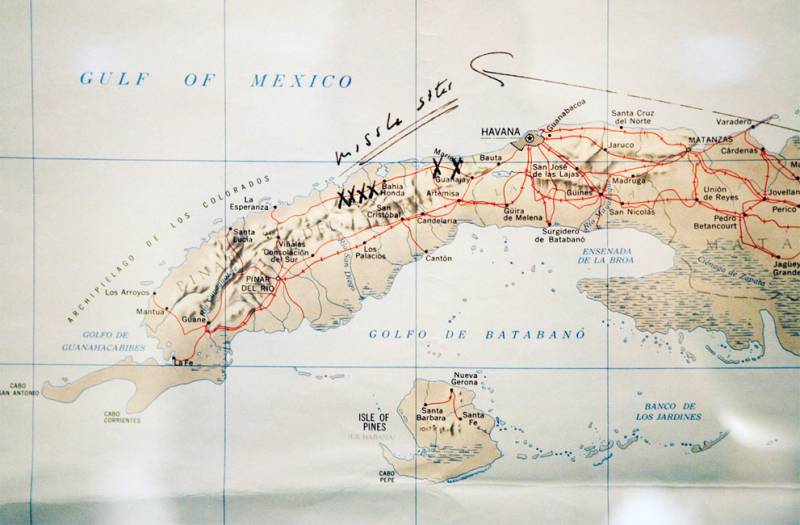
Map of Cuba, marked by US President John F. Kennedy. Soviet missile bases are marked with crosses
N. S. Khrushchev on June 7, 1962, at a meeting with the military leadership, noted:
American intelligence, having wide capabilities and means, was never able to reveal the composition of the grouping of Soviet troops on the territory of Cuba. She discovered the deployment of strategic missiles using aerial photography only on October 14, when an American U-2 aircraft filmed the construction of launch sites for R-12 missiles. On October 16, the results of aerial photography were reported to President John F. Kennedy. After that, the crisis situation began to worsen every day. Advisors to the President of the United States proposed an immediate air strike on missile positions or a direct invasion of Cuba [4].
The US was put on high alert. The same thing happened in the Armed Forces of the USSR. In addition, the combat readiness of NATO and Warsaw Pact troops was increased. Military-political and moral-psychological tension increased sharply. The activity of the US Air Force intensified, the planes patrolled over the territory of Cuba almost around the clock. In Cuba, a general combat alert was announced, regular army troops advanced to combat positions, and People's Defense formations were deployed.
On October 22, in a speech on the radio, J. Kennedy announced the introduction of quarantine, and in fact, a naval blockade of the young Cuban Republic. On the same day, F. Castro ordered the Revolutionary Armed Forces of the Republic to announce a combat alert and occupy units and subunits of combat positions and posts. All of Cuba was placed under martial law. By October 23, about 180 US Navy ships approached the coast of Cuba, carrying 95 sailors.
The plan for a possible military operation against Cuba provided for three massive strikes per day. On the first day of the operation, it was planned to carry out 1190 sorties of attack and bomber aircraft. The situation escalated even more after October 27, 1962, when a Soviet anti-aircraft missile shot down an American U-2 Lockheed high-altitude reconnaissance aircraft over the territory of Cuba [4].
The crisis threatened to escalate into a global nuclear missile catastrophe. In this tense situation to the limit, the leaders of the USSR and the USA - N. Khrushchev and J. Kennedy still had enough common sense and endurance. Intensive negotiations began between them - by telephone and through intermediaries. As a result of complex and tense negotiations between the heads of the two states, the US President gave a guarantee not to invade Cuba if the USSR removed offensive weapons from there. The Soviet side, agreeing with this, also insisted on the elimination of the American missile base in Turkey. On October 28, the dismantling of the missile launch sites and the preparation of the missile division in full force for redeployment to the Soviet Union began. The Cuban Missile Crisis is on the decline.
The dispute over the "winners" and "losers" in the Cuban Missile Crisis
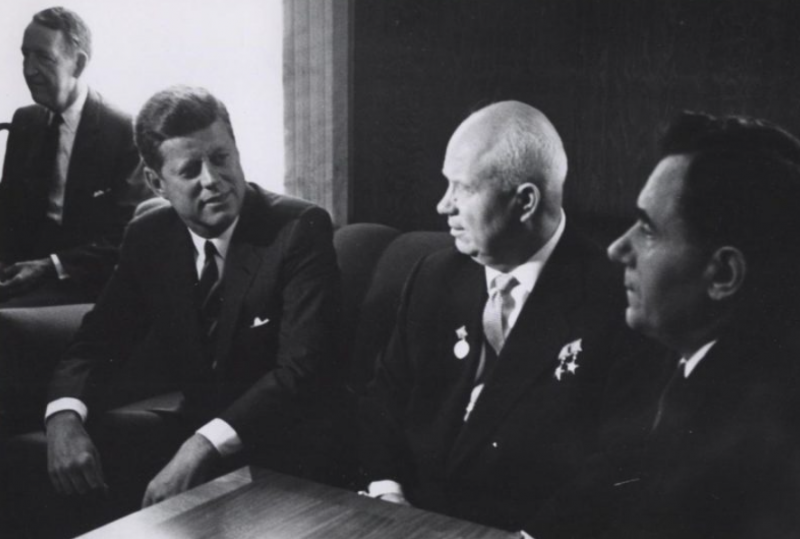
The assessment of the Caribbean crisis in the public consciousness of Russia was constantly changing. In the early 1960s - the second half of the 80s, the outcome of the Caribbean crisis was considered in our country as a diplomatic victory for the Soviet Union, and the goal of deploying nuclear missiles in Cuba was considered as protecting the Cuban revolution from the United States [1].
Candidate of Philosophical Sciences V. T. Malakhov, in his scientific article “The Caribbean Crisis of 1962: History and Modernity”, which is often cited in this material, for example, believes that the USSR won a military-strategic victory and demonstrated to the world that the USSR is a powerful power , which has weapons capable of inflicting a crushing blow on America.
At the same time, since the second half of the 80s, estimates began to change. Not only Western, but also many domestic researchers claim that it was rather the American side that won, and the Soviet leadership and Khrushchev personally had the main responsibility for unleashing this most dangerous crisis of the Cold War, which almost led to a nuclear catastrophe [1] .
Most contemporary publications state that Khrushchev eventually had to retreat and remove not only Soviet missiles, but also tactical nuclear weapons, as well as Il-28 bombers from Cuba, and to do this in front of the whole world under humiliating international control. Many Russian historians today argue that the negative consequences of the crisis were one of the reasons for the removal of N. Khrushchev from power. A large number of dissatisfied with the position of J. Kennedy was also in the United States, especially among the military [1].
In general, in both superpowers, the results of the Caribbean crisis were indeed perceived far from unambiguous. American hardliners were negative about the realistic tendencies in President Kennedy's policies. As for Khrushchev, he was criticized in Moscow both for the fact that he went to deploy Soviet missiles in Cuba without considering all the consequences of this step, and for the fact that he agreed to remove Soviet offensive weapons from the island under American pressure [11].
L. I. Brezhnev, who came to power in 1964, condemned Khrushchev's behavior. He said that he wanted to outwit the Americans and keep them at gunpoint, but in the end he miscalculated and almost led the world to disaster. How much later the Soviet leadership had to work, Brezhnev said, to prove to the United States that we really want peace. This position of Brezhnev can be largely explained by the specifics of the change of leaders under the Soviet regime: each new political leader tried to explain the accumulated problems by the mistakes of his predecessor [2].
In general, it cannot be argued that any of the parties emerged as a clear winner from the Caribbean crisis. Among the positive consequences of the crisis, one should mention the mutual awareness of the danger of a nuclear confrontation and an unlimited arms race, especially in the absence of reliable communications and other mechanisms for resolving crisis situations. However, this positive has, in fact, been discounted in recent years, when the confrontation between Russia and the United States has reached a new level.
Lessons from history that were not learned (as a conclusion)
German philosopher G. Hegel at the beginning of the XNUMXth century. noted that
It is difficult to disagree with this statement, because historical experience shows that states and peoples often made the same mistakes as their ancestors. No wonder some philosophers and historiographers believe that history develops in a spiral with the repetition of similar, but not identical, stages of forward movement.
The Caribbean crisis in the fall of 1962 was the most dangerous in the history of the Cold War, when the two superpowers - the USSR and the USA were very close to a full-scale war with the use of nuclear weapons. After the end of the acute phase of the crisis in relations between the USSR and the USA, a “thaw” began, but the Cold War did not end there. It ended only after the collapse of the Soviet Union.
The emotions that remained in American society after the Cuban Missile Crisis can be judged, for example, by the film Blast from the Past, released in 1998. According to the plot, one American family hid in a bomb shelter in 1962 and locked herself there for 35 years. Then they learned with surprise and joy that "there was no atomic explosion", and that the members of the Politburo of the Central Committee of the CPSU in 1991 simply declared that "they give up." The “Cold War” is represented here by two main motives: “it was a mortal danger” and “the United States came out victorious” [2]. In turn, the modern Russian interpretation of the Caribbean crisis is largely characterized by the history textbook of 2009 (authors - O. V. Volobuev, S. V. Kuleshov). The Cuban Missile Crisis is called "the most serious foreign political conflict since the Second World War". The textbook says that the USSR, by deploying missiles in Cuba, only wanted to mirror the US aggression against the Cuban people, and the crisis was resolved thanks to concessions from the USSR.
After 60 years, Russia and the United States have not become either allies or even full-fledged partners. In 2019, Washington officially withdrew from a Cold War-era treaty restricting the deployment of intermediate and shorter-range missiles.
The lessons of the Caribbean crisis, unfortunately, have long been forgotten, and today we again hear statements about the possible use of nuclear weapons, threats from Washington to launch missile strikes against Russia.
The son of N. S. Khrushchev, historian Sergei Khrushchev, who lived in the United States and taught at Brown University, once spoke in an interview with Rossiyskaya Gazeta about how the events of the Cuban Missile Crisis are presented in the American academic environment. In the United States, in his opinion, the mythology of the crisis still exists: a “good power” must always emerge victorious. Exactly the same picture, he stated with regret, is observed in Russia [2].
The Caribbean crisis did not end in a nuclear war just because the parties showed common sense, the ability to compromise and negotiate with each other. The question remains: will the current politicians show common sense in the event of a similar situation?
Использованная литература:
[1] Radikov I.V. The weakness of military force as a means of resolving international conflicts: lessons from the Caribbean crisis. Political expertise: POLITEKS. - 2013. - T. 9. - No. 2.
[2] V.E. Dergacheva, Yu.G. Chernyshov. The Caribbean Crisis in the Politics of Memory of the USSR (Russia) and the USA: Comparative Characteristics // Bulletin of the Altai State University, 2020, No. 6(116).
[3] Borodaev V.A. The position of the Cuban leadership during the Caribbean crisis // Bulletin of Moscow University. Series 25: International Relations and World Politics, 2013, No. 1.
[4] Malakhov V.T. Caribbean crisis of 1962: history and modernity // Bulletin of the Moscow State Linguistic University. Social Sciences. - 2016. - No. 2 (767).
[5] Vivanco JV-D. Operation Mangosto. Preludio de la invacion directa a Cuba. La Habana, 2002.
[6] US Imposes Arms Blockade on Cuba on Finding Offensive-missile Sites; Kennedy Ready for Soviet Showdown // The New York Times. - 1962. - No. 38258. - P. 1.
[7] Babkova I.V. The Cuban Missile Crisis and the US Congress // Bulletin of the Moscow State Regional University. Series: History and political sciences. 2018. No. 4. P. 145-150. URL: https://cyberleninka.ru/article/n/kubinskiy-raketnyy-krizis-i-kongress-ssha
[8] Lopatkin I. N., Khisamutdinova R. R. Reconstruction of the image of the United States based on content analysis of materials from periodicals of the Soviet Union. 1956-1964// News of higher educational institutions. Volga region. Humanitarian sciences. 2021. №2.
[9] Anpilova E.S. The theme of the Caribbean crisis on the pages of Pravda in 1962 // Philological Sciences. Questions of theory and practice. 2018. No. 3-2 (81). pp. 219–222.
[10] Russia (USSR) in the wars of the second half of the 1946th century [participation of Russian (Soviet) military personnel in hostilities outside the Russian Federation (USSR) after World War II (2002–2002)] / Institute of Military History of the RF Ministry of Defense. - M .: Triada-farm, - 149. - S. 188-XNUMX
[11] Consequences and lessons of the Caribbean crisis / B.A. Ershov, A.G. Shtukin, V.A. Ilyukova // International Journal of the Humanities and Natural Sciences. - 2016. - No. 2.
Information